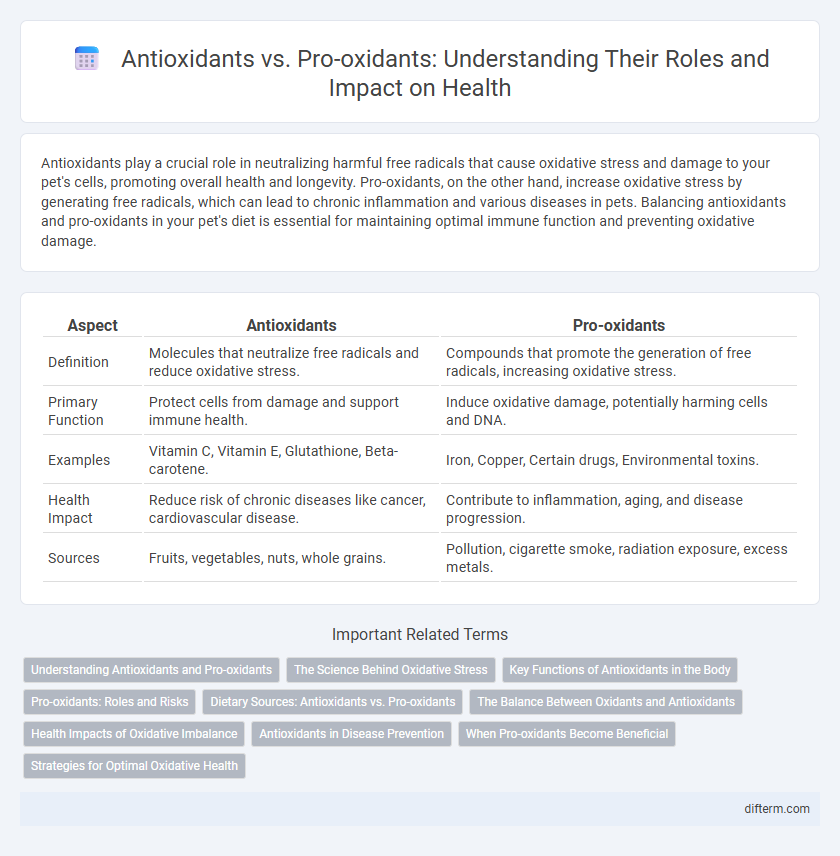Antioxidants play a crucial role in neutralizing harmful free radicals that cause oxidative stress and damage to your pet's cells, promoting overall health and longevity. Pro-oxidants, on the other hand, increase oxidative stress by generating free radicals, which can lead to chronic inflammation and various diseases in pets. Balancing antioxidants and pro-oxidants in your pet's diet is essential for maintaining optimal immune function and preventing oxidative damage.
Table of Comparison
| Aspect | Antioxidants | Pro-oxidants |
|---|---|---|
| Definition | Molecules that neutralize free radicals and reduce oxidative stress. | Compounds that promote the generation of free radicals, increasing oxidative stress. |
| Primary Function | Protect cells from damage and support immune health. | Induce oxidative damage, potentially harming cells and DNA. |
| Examples | Vitamin C, Vitamin E, Glutathione, Beta-carotene. | Iron, Copper, Certain drugs, Environmental toxins. |
| Health Impact | Reduce risk of chronic diseases like cancer, cardiovascular disease. | Contribute to inflammation, aging, and disease progression. |
| Sources | Fruits, vegetables, nuts, whole grains. | Pollution, cigarette smoke, radiation exposure, excess metals. |
Understanding Antioxidants and Pro-oxidants
Antioxidants are molecules that neutralize free radicals by donating electrons, preventing cellular damage and oxidative stress linked to aging and chronic diseases. Pro-oxidants, in contrast, promote oxidative stress by generating reactive oxygen species (ROS), which can damage DNA, proteins, and lipids if not balanced by antioxidants. Understanding the delicate balance between antioxidants and pro-oxidants is crucial for maintaining cellular health and preventing oxidative damage-associated illnesses.
The Science Behind Oxidative Stress
Oxidative stress occurs when reactive oxygen species (ROS), including free radicals, overwhelm the body's antioxidant defenses, leading to cellular damage. Antioxidants neutralize ROS by donating electrons, thereby preventing damage to DNA, lipids, and proteins, which is crucial in reducing inflammation and chronic disease risk. In contrast, pro-oxidants promote the formation of ROS, exacerbating oxidative stress and contributing to aging, cancer, and cardiovascular diseases.
Key Functions of Antioxidants in the Body
Antioxidants play a crucial role in neutralizing harmful free radicals, preventing oxidative stress that can damage cells and DNA. They support the body's defense systems by enhancing immune function and reducing inflammation. Key antioxidants such as vitamins C and E, selenium, and glutathione contribute to maintaining cellular health and slowing the aging process.
Pro-oxidants: Roles and Risks
Pro-oxidants play a crucial role in cellular signaling and immune defense by generating reactive oxygen species (ROS) that combat pathogens and regulate cell growth. However, excessive accumulation of pro-oxidants contributes to oxidative stress, leading to DNA damage, inflammation, and increased risk of chronic diseases such as cancer, cardiovascular disorders, and neurodegeneration. Balancing pro-oxidant levels with antioxidants is essential to maintaining cellular homeostasis and preventing tissue injury.
Dietary Sources: Antioxidants vs. Pro-oxidants
Dietary antioxidants, abundant in fruits such as berries, vegetables like spinach, and nuts including almonds, neutralize free radicals and reduce oxidative stress. Pro-oxidants, found in high concentrations in processed foods, charred meats, and excessive alcohol, promote oxidative damage by generating free radicals beyond the body's antioxidant defense capacity. Balancing intake of antioxidants from plant-based foods with limiting exposure to pro-oxidants supports optimal cellular health and mitigates chronic disease risk.
The Balance Between Oxidants and Antioxidants
Maintaining a balance between antioxidants and pro-oxidants is crucial for preventing oxidative stress, which damages cells and contributes to chronic diseases. Antioxidants neutralize harmful free radicals generated by pro-oxidants, supporting cellular health and immune function. Disruptions in this balance can accelerate aging processes and increase vulnerability to conditions such as cardiovascular disease and cancer.
Health Impacts of Oxidative Imbalance
Oxidative imbalance caused by excessive pro-oxidants leads to cellular damage and increased risk of chronic diseases, including cardiovascular disorders, cancer, and neurodegeneration. Antioxidants neutralize free radicals, preventing oxidative stress and supporting immune function, but an overabundance can disrupt redox signaling and impair physiological processes. Maintaining a balanced ratio between antioxidants and pro-oxidants is crucial for cellular homeostasis and overall health optimization.
Antioxidants in Disease Prevention
Antioxidants play a crucial role in disease prevention by neutralizing free radicals that cause oxidative stress, a key factor in chronic conditions such as cancer, cardiovascular diseases, and neurodegenerative disorders. Key antioxidants like vitamins C and E, selenium, and flavonoids help maintain cellular integrity by reducing DNA damage and inflammation. Research highlights that diets rich in antioxidant-containing fruits, vegetables, and whole grains correlate with lower incidence rates of age-related diseases and improved overall health outcomes.
When Pro-oxidants Become Beneficial
Pro-oxidants become beneficial when they trigger the body's natural defense mechanisms, promoting cellular repair and enhancing immune response. Controlled exposure to pro-oxidants, such as exercise-induced oxidative stress, stimulates the production of endogenous antioxidants like glutathione and superoxide dismutase. This adaptive response helps maintain redox balance and supports overall health by preventing oxidative damage and reducing the risk of chronic diseases.
Strategies for Optimal Oxidative Health
Balancing antioxidants and pro-oxidants is crucial for optimal oxidative health, as antioxidants neutralize harmful free radicals while controlled pro-oxidant activity supports cellular signaling and immune response. Incorporating a diet rich in vitamin C, vitamin E, and polyphenols, combined with regular physical activity, enhances antioxidant defenses and mitigates oxidative stress. Monitoring biomarkers like malondialdehyde and glutathione levels guides personalized strategies to maintain redox homeostasis and prevent chronic diseases.
Antioxidants vs Pro-oxidants Infographic

 difterm.com
difterm.com